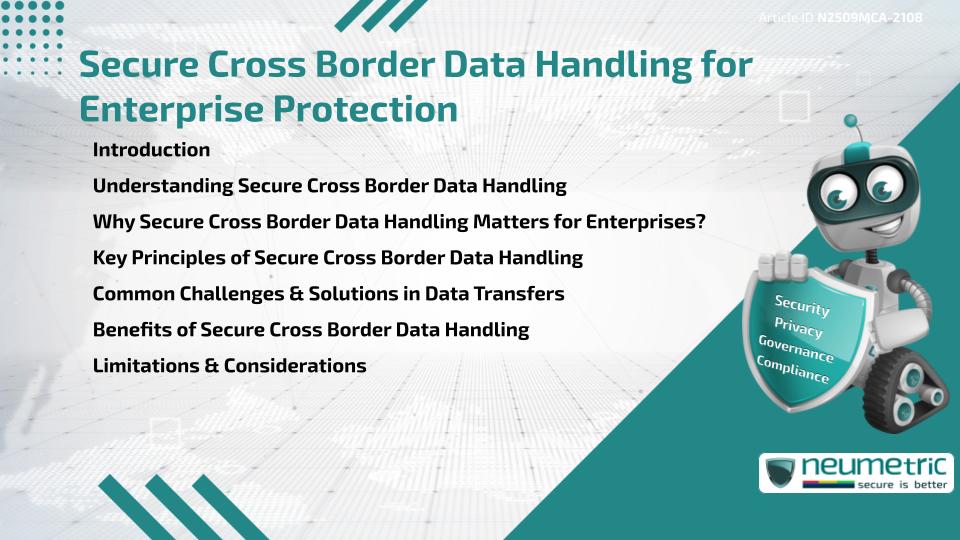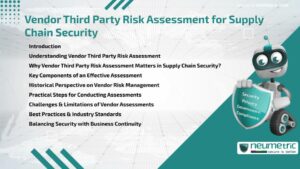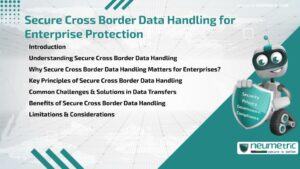Table of Contents
ToggleIntroduction
The Secure Cross Border Data Handling process ensures that Personal & Business Information transferred between Countries remains protected against Misuse, Breaches & Regulatory Violations. With Enterprises relying on Global Supply Chains, Cloud Services & Remote Teams, the need to Safeguard Sensitive Data across Jurisdictions is Critical. This Article explores the importance, principles, challenges & benefits of Secure Cross Border Data Handling for Enterprise Protection.
Understanding Secure Cross Border Data Handling
Secure Cross Border Data Handling involves applying Legal, Technical & Organisational Safeguards when Data leaves one Jurisdiction & Enters another. It ensures Compliance with Regional Regulations such as GDPR, HIPAA & the Digital Personal Data Protection Act, 2023 in India, while protecting Enterprise Assets from Cyber Threats & Misuse.
The goal is to balance Global Data flows with Privacy & Security requirements. For guidance, see OECD Privacy principles.
Why Secure Cross Border Data Handling Matters for Enterprises?
Global Enterprises frequently share Sensitive Information with Subsidiaries, Cloud Providers & Third Party Vendors located in different Countries. Secure Cross Border Data Handling is essential because it:
- Ensures Compliance with International Data Protection Laws.
- Reduces Risks of Data Breaches & Financial Penalties.
- Builds Customer & Regulator Trust.
- Enables smooth Global Operations without Legal Roadblocks.
The European Commission transfer rules illustrate the importance of Compliance in International Data transfers.
Key Principles of Secure Cross Border Data Handling
- Legal Safeguards – Use Standard Contractual Clauses [SCCs], Binding Corporate Rules [BCRs] or Adequacy decisions for Lawful transfers.
- Data Minimisation – Share only what is necessary to reduce exposure.
- Encryption & Security Controls – Apply end-to-end Encryption & Monitoring for all transfers.
- Vendor Due Diligence – Assess Third Parties for Compliance & Security Maturity.
- Transparency & Accountability – Inform Data Subjects about transfer practices & maintain Audit Trails.
For detailed practices, see the NIST Privacy Framework.
Common Challenges & Solutions in Data Transfers
- Regulatory Variability – Map out requirements across different Jurisdictions to avoid conflicts.
- Third Party Risks – Establish Contractual & Technical Controls with Vendors.
- Data Localisation Laws – Implement Hybrid Models to balance Compliance & Business needs.
- Operational Complexity – Use Compliance Software for Real-time monitoring of Global Data flows.
The NCSC UK guidance provides practical tools for overcoming such challenges.
Benefits of Secure Cross Border Data Handling
- Legal Compliance – Reduces Liability under Laws like GDPR & HIPAA.
- Enhanced Security – Protects Sensitive Business & Personal Information.
- Business Continuity – Ensures Global Operations are not disrupted by Compliance Gaps.
- Reputation & Trust – Demonstrates Accountability to Customers, Partners & Regulators.
Limitations & Considerations
Secure Cross Border Data Handling depends on evolving Laws & International Agreements. Enterprises must continuously update Policies & Controls to keep pace. Over-reliance on Contracts without Technical Measures may still expose Data to Risks, making layered Safeguards essential.
Takeaways
- Secure Cross Border Data Handling protects Sensitive Information across Jurisdictions.
- It requires Legal, Technical & Organisational Safeguards.
- Compliance strengthens trust, reduces Risks & ensures Business Continuity.
FAQ
What is Secure Cross Border Data Handling?
It is the practice of Safeguarding Personal & Business Data during International transfers.
Why is it important for Enterprises?
It ensures Compliance with Global Laws, reduces Risks & Supports seamless Global Operations.
What Safeguards are used?
Legal Contracts, Encryption, Vendor Oversight & Continuous Monitoring.
Does it apply to all Companies?
Yes, any Enterprise transferring Sensitive Data across Borders must Comply.
Can Technology alone ensure Compliance?
No, Compliance also requires Governance, Contracts & Regulatory Alignment.
References
- OECD – Privacy Principles
- European Commission – International Data Protection
- NIST – Privacy Framework
- NCSC UK – Data Protection Guidance
- IT Governance – Data Protection Resources
Need help for Security, Privacy, Governance & VAPT?
Neumetric provides organisations the necessary help to achieve their CyberSecurity, Compliance, Governance, Privacy, Certifications & Pentesting needs.
Organisations & Businesses, specifically those which provide SaaS & AI Solutions in the Fintech, BFSI & other regulated sectors, usually need a CyberSecurity Partner for meeting & maintaining the ongoing Security & Privacy needs & requirements of their Enterprise Clients & Privacy conscious Customers.
SOC 2, ISO 27001, ISO 42001, NIST, HIPAA, HECVAT, EU GDPR are some of the Frameworks that are served by Fusion – a SaaS, multimodular, multitenant, centralised, automated, CyberSecurity & Compliance Management system.
Neumetric also provides Expert Services for technical Security which covers VAPT for Web Applications, APIs, iOS & Android Mobile Apps, Security Testing for AWS & other Cloud Environments & Cloud Infrastructure & other similar scopes.
Reach out to us by Email or filling out the Contact Form…





